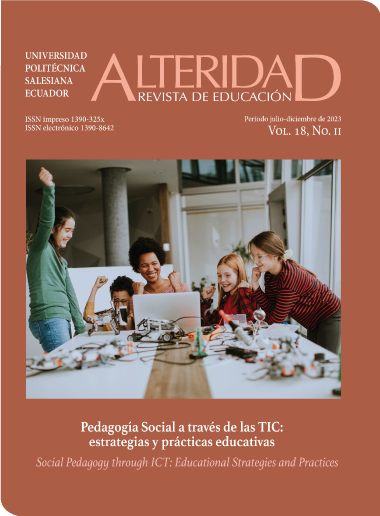The social and cultural context on literacy in High School
Main Article Content
Abstract
Article Details

This work is licensed under a Creative Commons Attribution-NonCommercial-ShareAlike 4.0 International License.
Authorship: The list of authors signing must include only those people who have contributed intellectually to the development of the work. Collaboration in the collection of data is not, by itself, a sufficient criterion of authorship. "Alteridad" declines any responsibility for possible conflicts arising from the authorship of the works that are published.Copyright: The Salesian Polytechnic University preserves the copyrights of the published articles, and favors and allows their reuse under the Creative Commons Attribution-NonCommercial-ShareAlike 3.0 Ecuador license. They may be copied, used, disseminated, transmitted and publicly displayed, provided that: i) the authorship and the original source of their publication (journal, editorial and work URL) are cited; (Ii) are not used for commercial purposes; Iii) mention the existence and specifications of this license.
References
Jorge-Soneira, A. (2006). La teoría fundamentada en los datos. En I. Vasilachis (coord.), Estrategias de la investigación cualitativa (pp. 153-173). Gedisa.
Aguilar Peña, P., Albarrán Vergara, P., Errázuriz Cruz, M. y Lagos Paredes, C. (2016). Teorías implicas sobre los procesos de escritura: Relación de las concepciones de estudiantes de Pedagogía Básica con la calidad de sus textos. [Implicit Theories about Writing Processes: The relation between the conceptions of Elementary Childhood Education Students and the quality of their Texts]. Estudios Pedagógicos, 42(3), 7-26. http://dx.doi.org/10.4067/S0718-07052016000400001
Alarcón Pérez, L., Fernández Pérez, J. y Figueroa Lozada, M. (2009). La problemática de la lectura en el bachillerato. [The problematic of the Reading in upper secunday education]. Graffilya, 6(10), 193-2002. https://bit.ly/3CLXfw3
Alfaro Muñoz, L. y Tejeda Acuña, J. (2010). Estrategias de enseñanza para la lectoescritura en el Colegio Francoise Dolto, en segundo año de primaria [Tesis de licenciatura, Universidad Pedagógica Nacional Ajusco]. Archivo digital de la Universidad Pedagógica Nacional. https://bit.ly/3pzZCuX
Alpuche Hernández, A. y Vega Pérez, L. (2014). Predicción del comportamiento lector a partir de la autoeficacia. [Prediction of Reader Behavior Based on Self-eff ectiveness]. Revista Mexicana de Investigación Educativa RMIE, 19(60), 241-266. https://bit.ly/3pgJi1N
Anguera, M. (2008). Evaluación de programas desde la metodología Cualitativa. [Program evaluation from Qualitative Methodology]. Revista Acción Psicológica, 5(2),87-101. https://doi.org/10.5944/ap.5.2.460
Aparicio, S., Luna, V. y Olguín, C. Taller de lectura y redacción I. Gafra.
Bardin, L. (1996). Análisis de contenido. Akal.
Brand, J. (2017). El docente lector como formador de ciudadanos. Alteridad, 12(2), 165-174. https://doi.org/10.17163/alt.v12n2.2017.03
Sergio-Benítez, G. (2015). Desafíos de la Educación Media Superior. En R. Ramírez (coord.), Desafíos de la Educación Media Superior (pp.15-61). Senado de la República. https://bit.ly/3fOTAEp
Caride-Gómez, J. A. (2016). Del leer educando al educar leyendo como educación social. En S. Yubero, J. A. Caride y E. Larrañaga (coords.), Educación social y alfabetización Lectora (pp. 9-24). Síntesis.
Carlino, P. (2013). Alfabetización académica diez años después. [Academic literacy as proposed ten years ago]. Revista Mexicana de Investigación Educativa, 18(57), 355-381. https://bit.ly/3sVPr60
Cassany, D. (1999). Construir la escritura. Paidós.
Castro, M. C. y Sánchez M. (2018). La construcción de opinión: posicionamiento y voz en textos académicos. En L. Natale y D. Stagnaro (coords.), La lectura y la escritura en las disciplinas. Lineamientos para su enseñanza (pp. 137-166). Universidad Nacional de General Sarmiento. https://bit.ly/3SVTbi8
Chomsky, N. (1980). Estructuras sintácticas. Siglo XXI.
Díaz-Barriga, A. (2014). Competencias. Tensión entre programa político y proyecto educativo. [Competence. Tension between the political program and education projec]. Propuesta Educativa, (42), 9-27. https://bit.ly/3IZc8LS
Díaz-Barriga, F. y Aguilar, J. (1988). Estrategias de aprendizaje para la comprensión de textos académicos en prosa. [Learning strategies for understand academic texts]. Perfiles educativos, (41), 28-47. https://bit.ly/3VhtV7x
Ferreiro, E. (2006). La escritura antes de la letra. [The writing before the letter]. Revista de Investigación Educativa, 3, 2-52. https://bit.ly/3hg7mxi
Ferreiro, E. y Teberosky, A. (2013). Los sistemas de escritura en el desarrollo del niño. Siglo XXI Editores.
Flick, U. (2015). El diseño de la investigación cualitativa. Ediciones Morata.
Foucault, M. (2017). La arqueología del saber. Siglo XXI Editores.
Foucault, M. (2019). Las palabras y las cosas. Una arqueología de las ciencias humanas. Siglo XXI Editores.
Halliday, M. (2017). El lenguaje como semiótica social. La interpretación social del lenguaje y del significado. Fondo de Cultura Económica.
Hernández-Zamora, G. (2016). Literacidad Académica. Universidad Autónoma Metropolitana.
Jakobson, R. (1983). Lingüística y poética. Cátedra.
Kippendorff, K. (1990). Metodología de análisis de contenido. Teoría y práctica. Paidós
Marín, M. (2006). Alfabetización académica temprana. [Premature academic literacy] Lectura y vida: Revista latinoamericana de lectura, 27(4), 30-39. https://bit.ly/34tF7Zq
Márquez, A. (2017). Sobre lectura, hábito lector y sistema educativo. [Abaut reading, reading habit and education system]. Perfiles educativos, 39(155), 3-18. https://doi.org/10.22201/iisue.24486167e.2017.155.58100
Montealegre, R. y Forero, L. A. (2006). Desarrollo de la lectoescritura: adquisición y dominio. [Development of reading/writing skills:acquisition and dominion]. Acta Colombiana de Psicología, 9(1), 25-40. https://bit.ly/3vaTvAJ
Montoya, S. (2017, 29 de septiembre). La mayoría de latinoamericanos culminan la secundaria sin saber leer bien. Semana. https://bit.ly/3vfem5P
Padilla-Berdugo, R. A., Amador-López, J. A. y Olivo-Franco, J. L. (2022). Fijaciones visuales y caracteres: incidencias en la comprensión de textos expositivos. Alteridad, (17)1, 126-137. https://doi.org/10.17163/alt. v17n1.2022.10
Parra, M. (1991). La lingüística textual y su aplicación a la enseñanza del español en el nivel universitario. Planteamientos teóricos. [Textual linguistic and implementation for the education of spanish at the university.Theory proposal]. Forma y función, (5), 47-64. https://bit.ly/3J2DuRi
Rivero, A. (2010). El aprendizaje del español en el nivel medio-superior. Diagnóstico y propuestas. [The learning spanish in upper secunday education. Diagnostic and appriach]. Revista de la Educación Superior, 39(4), 35-51. https://bit.ly/3epiLx8
Rodríguez, L. I. (2005). Ética argumentativa en Aristóteles. [The argumentative ethics in Aristotle]. Revista digital universitaria, 6(3), 2-15. https://bit.ly/3MlMPpO
Romero, E. y Lozano, A. I. (2010). Adquisición de las habilidades lingüísticas y cognitivas, relevancia para el aprendizaje del lenguaje escrito. [Acquisition of linguistic and cognitive skills, relevance for the written language leraning]. Umbral Científico, (16), 8-12. https://bit.ly/3vRbPix
Villalón, R. y Mateos, M. (2009). Concepciones del alumnado de secundaria y universidad sobre la escritura académica. [Secondary and university students' conceptions about academic writing]. Infancia y aprendizaje, 32(2), 219-232. https://doi.org/10.1174/021037009788001761

